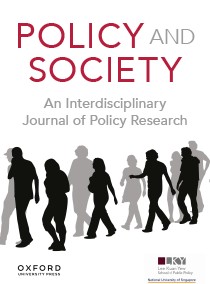Explaining regulatory intermediaries’ compliance through the accountability regimes framework
IF 6.1
1区 社会学
Q1 POLITICAL SCIENCE
引用次数: 0
Abstract
This article assesses how accountability relations between intermediaries, regulators, and regulatory targets affect intermediary non-compliance. Regulatory intermediary theory (RIT) maps how intermediaries, who are given responsibility but often lack hierarchical accountability to regulators, have multiple roles in the process of regulatory compliance. Intermediaries need to comply with the tasks that they have been delegated to perform. However, beyond acknowledging the importance of complex actor relations, RIT lacks a clear theory of how these relationships may affect the realization of regulatory intentions during policy implementation. This article introduces the accountability regimes framework (ARF) to model the multiple formal and informal roles of intermediaries, identify accountability dilemmas, and theorize the conditions under which they trigger intermediary non-compliance. The ARF is applied to study “Prevent Duty,” an anti-radicalization policy which requires social science lecturers in British universities to report students deemed at risk of radicalization to the Home Office. Semi-structured qualitative interviews conducted with intermediaries in May 2021 (N = 19) are analyzed using crisp-set Qualitative Comparative Analysis. Results support the ARF’s core claims: in a politicized context of mandated, interpretive intermediation, the presence of multiple accountability dilemmas can trigger non-compliance, while their absence is related to compliance. Institutions can mitigate this intermediary non-compliance by providing training to intermediaries. Results additionally show that the mandated, politicized intermediaries may informally appropriate the regulator’s role of risk assessment. The ARF allows RIT scholars to understand intermediaries’ compliance as a problem of accountability.通过问责制框架解释监管中介机构的合规情况
本文评估了中介机构、监管机构和监管目标之间的问责关系如何影响中介机构的不合规。监管中介理论(Regulatory intermediary theory, RIT)描绘了被赋予责任但往往缺乏对监管机构分层问责的中介机构如何在监管合规过程中扮演多重角色。中介体需要遵守委托给它们执行的任务。然而,除了承认复杂的行动者关系的重要性之外,RIT缺乏一个明确的理论来说明这些关系如何在政策实施过程中影响监管意图的实现。本文引入问责制度框架(ARF),对中介机构的多种正式和非正式角色进行建模,识别问责困境,并将引发中介机构不合规的条件理论化。ARF被用于研究反激进化政策“防止责任”(Prevent Duty)。该政策要求英国大学的社会科学讲师向内政部报告被认为有激进化危险的学生。在2021年5月与中介机构进行的半结构化定性访谈(N = 19)使用crisp-set定性比较分析进行分析。结果支持了ARF的核心主张:在强制性解释性中介的政治化背景下,多重问责困境的存在可能引发不合规,而不存在这些困境则与合规有关。机构可以通过向中介人提供培训来减轻这种中介人不遵守规定的情况。结果还表明,被授权的、政治化的中介机构可能非正式地取代了风险评估监管者的角色。ARF允许RIT学者将中介机构的合规理解为问责问题。
本文章由计算机程序翻译,如有差异,请以英文原文为准。
求助全文
约1分钟内获得全文
求助全文
来源期刊

Policy and Society
Multiple-
CiteScore
18.00
自引率
6.50%
发文量
43
审稿时长
30 weeks
期刊介绍:
Policy and Society is a prominent international open-access journal publishing peer-reviewed research on critical issues in policy theory and practice across local, national, and international levels. The journal seeks to comprehend the origin, functioning, and implications of policies within broader political, social, and economic contexts. It publishes themed issues regularly and, starting in 2023, will also feature non-themed individual submissions.
 求助内容:
求助内容: 应助结果提醒方式:
应助结果提醒方式:


